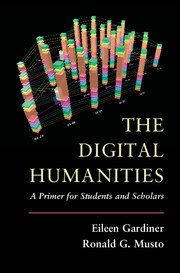Book contents
- Frontmatter
- Contents
- List of Illustrations
- Preface and Acknowledgments
- 1 Introduction to the Digital Humanities
- 2 The Organization of Humanities Research
- 3 The Elements of Digital Humanities: Text and Document
- 4 The Elements of Digital Humanities: Object, Artifact, Image, Sound, Space
- 5 Digital Tools
- 6 Digital Environments
- 7 Publication: Prerelease, Release and Beyond
- 8 The Meta-Issues of Digital Humanities 1
- 9 Meta-Issues 2: Copyright and Other Rights, Digital Rights Management, Open Access
- 10 The Evolving Landscape for the Digital Humanities
- Epilogue: The Half-Life of Wisdom
- Appendix: Digital Tools
- Notes
- Glossary
- Bibliography on Digital Humanities
- Index
2 - The Organization of Humanities Research
Published online by Cambridge University Press: 05 July 2015
- Frontmatter
- Contents
- List of Illustrations
- Preface and Acknowledgments
- 1 Introduction to the Digital Humanities
- 2 The Organization of Humanities Research
- 3 The Elements of Digital Humanities: Text and Document
- 4 The Elements of Digital Humanities: Object, Artifact, Image, Sound, Space
- 5 Digital Tools
- 6 Digital Environments
- 7 Publication: Prerelease, Release and Beyond
- 8 The Meta-Issues of Digital Humanities 1
- 9 Meta-Issues 2: Copyright and Other Rights, Digital Rights Management, Open Access
- 10 The Evolving Landscape for the Digital Humanities
- Epilogue: The Half-Life of Wisdom
- Appendix: Digital Tools
- Notes
- Glossary
- Bibliography on Digital Humanities
- Index
Summary
INTRODUCTION
Humanists study the world created by humanity. Based on considerable research, and with specific questions in mind, they define a corpus of material for investigation – their evidence – whether it is the compositions of Mozart or the paintings of Michelangelo, the buildings of Frank Gehry or the voting records of the Venetian Senate, the cuneiform tablets of the ancient Near East, the land grants of the American West, the life and thought of a fourteenth-century queen or of a twentieth-century philosopher. This evidence can include text, document, object, space, performance, artifact or construct (including games, simulations and virtual worlds).
Because so many who are involved in the administration of colleges and universities may not come from a humanist background, misunderstanding, misconception and underappreciation of the work done by humanists can be found even within academia. Administrators are far more likely to understand how scientists and social scientists work. From biology – the study of life and living organisms (including humans) – to physics – the study of matter and its motion through space and time – researchers in the physical and life sciences attempt to understand the material world using the “scientific method,” or inquiry based on empirical and measurable evidence gathered through observation and experimentation and subject to specific principles of reasoning and critique. However, from physicists to mathematicians, scientists also employ theoretical models in their work and combine theoretical with empirical approaches.
The social sciences, which include a wide range of disciplines from anthropology and economics to political science and sociology, use the empirical methods of their counterparts in the sciences when collecting data on society and social groups, then process that data quantitatively to better understand how these groups function. Social science can also be interpretative and qualitative rather than quantitative, employing theories of social critique or symbolic interpretation, for example.
- Type
- Chapter
- Information
- The Digital HumanitiesA Primer for Students and Scholars, pp. 14 - 30Publisher: Cambridge University PressPrint publication year: 2015



